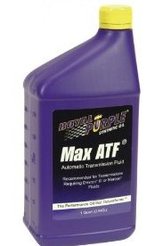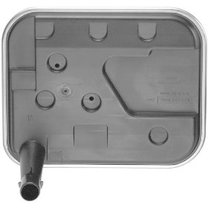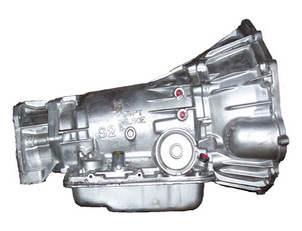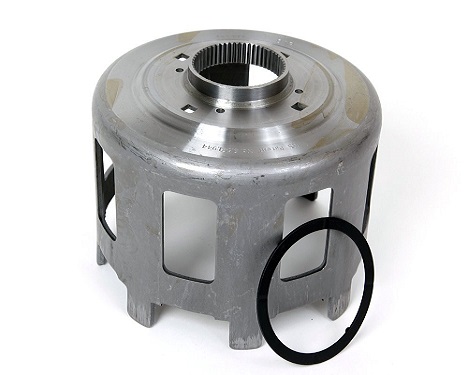Automatic Transmission Fluid Service

This post is about checking and changing automatic transmission fluid. At the bottom (Click the read more Link) is my personal story about the 4l60e transmission in my Chevy Blazer ZR2. First I wanted to make it clear that I am still undecided on whether changing the fluid in your automatic transmission is the right thing to do.
I have seen studies that support both sides of the question. I work for a large fleet company that tested several hundred vehicles and monitored the performance and failures of the automatic transmissions. The private study conducted by the fleet showed that there were just as many failures in the vehicles that had regular transmission services as the ones that received no transmission services.
With that being said I generally recommend them. For myself I follow the manufacturer’s guidelines for transmission fluid and filter changes. Just from experience in talking with customers it would seem that most drivers put this service on the back burner. Checking the transmission fluid before service begins is always a good idea.
Checking Automatic Transmission Fluid
Make sure your vehicle is on a level surface. Not all transmissions will have a dipstick but most still do. If your transmission does have a dipstick make sure you wipe the dirt off around the cover of the dipstick handle before you pull it out of the tube. This is to prevent dirt from falling down the tube and into the transmission oil.
In most cases the manufacturer recommends that you check the transmission fluid when the vehicle is at operating temperature and idling in Park. Leaning over a running engine requires extra caution to keep yourself clear of moving parts.
Remove the dipstick and wipe it clean with a lint free preferably white cloth or paper towel. Reinsert the dipstick until it is fully seated and then remove it once again to check the readings. Note that if you find that the automatic transmission fluid is low that you should only add a half court at a time until you receive a full reading.
Also note that if the fluid is low that you should do a check for external fluid leaks from the transmission itself. If the transmission is dry and the fluid level continues to become low checking for leakage in the transmission cooler should also be done. In most vehicles the cooler is integrated into the radiator. If transmission fluid is leaking into the radiator it will turn the coolant pink and milky.
Automatic Transmission Fluid Service

Transmission fluid and filter changes are part of your vehicle’s preventative maintenance program on most vehicles. It is important that you read your owner’s manual for the mileage that services are recommended. If you’re going to stick to this preventive maintenance plan is a good idea not to let it go too far past the recommended mileage point.
Also there is no reason to do the service early unless there is contamination in the fluid. On most automatic transmission you must remove the transmission pan to drain the fluid. Using a trashcan lid with holes drilled in the center to catch the fluid will help reduce the mess. Some manufacturers provide a transmission drain plug that makes the job much easier.
In either case the transmission pan must be removed to access the filter. Most transmission filters are made out of fabric or paper and attached to valve body by screws, clips or bolts. It is recommended that you do not clean the automatic transmission fluid filter but instead replace it. You also want to inspect the filter for signs of metal shavings and even broken internal components. This could be a sign that the transmission is having an internal problem.
You also want to inspect the inside bottom of the transmission pan for debris and friction material. Note that some deposits of friction material would be considered normal wear. Also most transmission pans have a magnet at the bottom that should be cleaned and reinstalled in the pan. The magnet is supposed to pull material out of the fluid to reduce internal wear.
When reassembling the pan is recommended to either reuse the pan gasket from the factory if indicated by the service manuals or sometimes it’s printed on the gasket itself (reusable gasket). Sometimes the factory gasket is better than an aftermarket cork one supplied in the transmission service kit. I do not recommend that you apply silicone to the gasket as it may cause leakage.
When refilling the transmission make sure you check a quality auto repair manual for your vehicle’s fluid capacity. It is important not to overfill an automatic transmission. This can cause the fluid to foam and not properly lubricate the internal components.
My 4L60E Transmission Story

Some transmissions have inherent problems and will fail no matter how many transmission services are performed. In my 2004 Chevy Blazer I have the 4L60E transmission. An internal defect with the sun shell caused an alarming number of transmission failures in my model year ( Lucky Me !).
Changing the automatic transmission fluid will not have any effect on the strength of the sun shell. The problem with the 4L60E was addressed by turning down the line pressure when the vehicle is put in reverse. On my model year it is normal for there to be a slight delay engaging into reverse because of this temporary fix.

In the following model years they installed a stronger sun shell and the line pressure was adjusted back up. Just be aware that if you happen to have an automatic transmission with inherent problems, a transmission service will most likely not help your situation. In my case an inferior part that costs around $50 off the shelf could have made me feel a lot different about my experience with my Chevrolet Blazer.
As I stated above I still believe in following your manufacturer’s guidelines for replacing the automatic transmission fluid for maintenance reasons. I also recommend using a factory service kit as the quality does seem much higher when you compare the gaskets and transmission filters.

